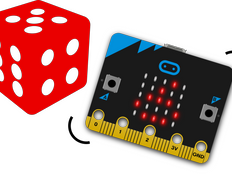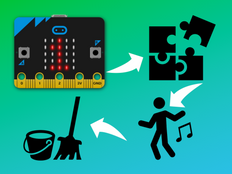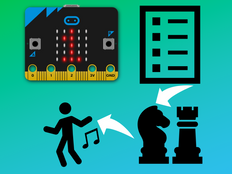Primeiro passo: o projeto
O que é?
O projeto gerador de poesia cria frases aleatórias que você pode usar em um poema, como senha ou para começar uma história. É agradável compartilhar, especialmente frases poéticas ou engraçadas, com seus amigos.
Estes dois vídeos mostram o que você fará e como desenvolver o código:
O que você vai aprender?
Você aprenderá sobre arrays, um tipo especial de variável. Arrays são uma maneira útil de armazenar dados em listas.
Como funciona:
- Quando você agita seu BBC micro:bit, uma frase aleatória é criada que consiste em um adjetivo, substantivo, verbo e, em seguida, um advérbio, por exemplo, ‘pássaro bonito come rapidamente’.
- Você pode usar sua frase para começar um poema ou junto com outras frases geradas por este programa para escrever um poema inteiro.
- O programa usa quatro arrays chamados ‘adjetivos’, ‘substantivos’, ‘verbos’ e ‘advérbios’.
- Cada array armazena uma lista de palavras. Cada item em um array é chamado de elemento. Os elementos são numerados com um índice. Por exemplo, o array ‘substantivo’ inclui três elementos: elemento 0, pássaro; elemento 1, borboleta; e elemento 2, libélula. Os índices são numerados a partir de 0 porque os computadores começam a contagem em 0.
- Quando você agita seu micro:bit, um número aleatório entre 0 e 2 é escolhido para cada array. Os elementos correspondentes a esses índices são exibidos no display de LED do micro:bit.
Itens necessários:
- Um micro:bit (ou simulador MakeCode);
- Editor MakeCode;
- Conjunto de baterias (opcional).
Segundo passo: é hora de programar
1# Imports go at the top
2from microbit import *
3import random
4
5adjectives = ['beautiful',
6 'delicate',
7 'bright']
8
9nouns = ['bird',
10 'butterfly',
11 'dragonfly']
12
13verbs = ['eats',
14 'flies',
15 'flutters']
16
17adverbs = ['swiftly',
18 'silently',
19 'skillfully']
20
21while True:
22 if accelerometer.was_gesture('shake'):
23 choice = random.randint(0, len(adjectives)-1)
24 display.scroll(adjectives[choice])
25 choice = random.randint(0, len(nouns)-1)
26 display.scroll(nouns[choice])
27 choice = random.randint(0, len(verbs)-1)
28 display.scroll(verbs[choice])
29 choice = random.randint(0, len(adverbs)-1)
30 display.scroll(adverbs[choice]) Terceiro passo: vamos deixar o código ainda melhor
- Adicione mais adjetivos, substantivos, verbos e advérbios ao programa.
- Encontre uma maneira de gerar mais linhas para o seu poema usando outras entradas, como o botão A ou o botão B.
- Você pode escrever um programa para gerar um haiku?
This content is published under a Creative Commons Attribution-ShareAlike 4.0 International (CC BY-SA 4.0) licence.


